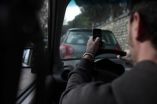(Press-News.org) Scientists from various Australian universities in collaboration with the University of Barcelona have compared the effects of mobile use while driving with the effects of alcohol using a simulation. Their experiment demonstrates that using a handsfree kit or sending text messages is the same as being above the legal alcohol limit.
The Australian universities of Wollongong, Victoria, Swinburne of Technology, the Institute for breathing and sleep and the University of Barcelona have measured the reaction capacity behind the wheel of twelve healthy volunteers who participated in a driving simulation test lasting two days, each a week apart.
On the one hand, they took the test having consumed alcohol, and on the other, while using the mobile telephone. Habitual drinkers and those who had never consumed alcohol before the test were not allowed to participate.
"We conducted the study in Australia and the participants, who were volunteer students holding a driving licence, had to keep their position in the centre of the left lane on the screen at a speed of between 60 and 80 kilometres per hour, breaking every time a lorry appeared," as explained to SINC by Sumie Leung Shuk Man, co-author of the study published in the 'Traffic Injury Prevention' journal and researcher at the University of Barcelona.
By comparing the blood alcohol concentration (BAC) with the effects of mobile phone usage, they saw that when the telephone conversation required high cognitive demand or when answering a text message, the BAC test was above legal limits in Spain (0.5 gram/litre). Headphones and a microphone were used to simulate the handsfree effect.
Handsfree does not pass the test
"When the conversation using the handsfree was simple, the effects were comparable to a BAC level of 0.04 g/l, which is below the legal limit of 0.5 g/l in countries like Spain and Australia. However, when more attention was required, their alcohol level analogue shot up to 0.7 g/l, which is above the legal limit in both countries yet below in other countries, like the USA or the UK where up to 0.8 g/l is allowed. When answering text messages, the rate stood at 1 g/l, which is illegal in any of all of these countries," states the scientist.
The two different handsfree conversation levels studied are the equivalent to: a natural conversation in which the subject and the scientist speak about an interesting subject but as a way of passing the time; and a dialogue with more specific, cognitively demanding questions, such as "can you describe the car journey from your work to your house?" or "how many of your friends have names that begin with a vowel?".
"Our results suggest that the use of handsfree devices could also put drivers at risk. Although they should be allowed, they require more research to determine how they should be regulated and, of course, the thorough knowledge that national authorities should have regarding their pros and cons," concludes the expert.
INFORMATION:
References:
Sumie Leung, Rodney J. Croft, Melinda L. Jackson, Mark E. Howard y Raymond J. Mckenzie, "A Comparison of the Effect of Mobile Phone Use and Alcohol Consumption on Driving Simulation Performance", Traffic Injury Prevention 13 (6): 566-574, noviembre 2012. DOI: 10.1080/15389588.2012.683118.
Answering messages behind the wheel is as dangerous as being twice over the limit
2013-03-13
ELSE PRESS RELEASES FROM THIS DATE:
Immune cells cluster and communicate 'like bees,' researcher says
2013-03-13
The immune system's T cells, while coordinating responses to diseases and vaccines, act like honey bees sharing information about the best honey sources, according to a new study by scientists at UC San Francisco.
"In the morning, each bee goes looking individually for a sugar source, then comes back to the hive and does a dance in front of the other bees describing the location of what it's found, which helps the hive decide collectively where the best source is," said senior scientist Matthew Krummel, PhD, a UCSF professor of pathology.
They don't bust the same ...
UT study identifies ways children can meet recommended activity goals
2013-03-13
KNOXVILLE—Despite overwhelming evidence about the benefits of physical activity for children, most American youngsters are not meeting the federal recommendation of 60 minutes a day.
A new study by a team of University of Tennessee researchers has identified specific ways—and estimated minutes for each approach—that can help children achieve the recommended daily physical activity goal.
The results of various approaches, ranging from mandatory physical education in school to changes in playground designs, were published recently in the American Journal of Preventive ...
Polo takes the bait
2013-03-13
KANSAS CITY, MO—A seemingly obscure gene in the female fruit fly that is only active in cells that will become eggs has led researchers at the Stowers Institute for Medical Research to the discovery of a atypical protein that lures, traps, and inactivates the powerful Polo kinase, widely considered the master regulator of cell division. Its human homolog, Polo-like kinase-1 (Plk1), is misregulated in many types of cancer.
Stowers Investigator and senior author R. Scott Hawley, Ph.D., hopes that this highly selective kinase trap might give drug developers, who are working ...
Medicare spending for advanced cancer not linked to survival differences
2013-03-13
Substantial regional variation in Medicare spending for patients with advanced cancer is not linked to differences in survival, according to a study published March 12 in the Journal of the National Cancer Institute.
Cancer care accounts for approximately 10% of Medicare spending, and costs are highest for cancer patients with late-stage disease. Prior research studies have shown that there are large regional differences in spending within the Medicare program, however it is unknown if higher average regional spending for advanced cancer is linked to improved survival ...
Study: Brain imaging after mild head injury/concussion can show lesions
2013-03-13
SAN DIEGO – Brain imaging soon after mild traumatic brain injury (mTBI) or mild concussion can detect tiny lesions that may eventually provide a target for treating people with mTBI, according to a study released today and that will be presented at the American Academy of Neurology's 65th Annual Meeting in San Diego, March 16 to 23, 2013.
Studies of brain tissue once a person has died have shown that different types of lesions are associated with more severe TBI. "Our study suggests that imaging may be used to detect and distinguish between these lesions in a living ...
Preventing HIV infection with anti-HIV drugs in people at risk is cost-effective
2013-03-13
An HIV prevention strategy in which people at risk of becoming exposed to HIV take antiretroviral drugs to reduce their chance of becoming infected (often referred to as pre-exposure prophylaxis or PrEP), may be a cost-effective method of preventing HIV in some settings, according to a study by international researchers published in this week's PLOS Medicine.
In an analysis of 13 modelling studies led by Gabriela Gomez from the Department of Global Health, Academic Medical Centre, University of Amsterdam/AIGHD in The Netherlands, the authors evaluated the impact of pre-exposure ...
Use of adjunctive antipsychotic medications in depression
2013-03-13
A study published this week in PLOS Medicine finds that while antipsychotic medications are associated with small-to-moderate improvements in depressive symptoms in adults, there is little evidence for improvement on measures of quality of life and these medications are linked to adverse events such as weight gain and sedation.
The results of the study, conducted by Glen Spielmans of Metropolitan State University in St. Paul, Minnesota and colleagues, have potential implications for the treatment of depression by providing clinicians with a better understanding of the ...
Ethical oversight needed for social network health research
2013-03-13
Participant-led research, such as studies conducted via social networks, are increasingly common and have several advantages over more standard research but there are some concerns about their ethical oversight, according to experts writing in this week's PLOS Medicine.
Effy Vayena from the University of Zurich in Switzerland and John Tasioulas from University College London argue that the distinctive nature of such participant-led research means that the standards of ethical oversight should be adapted to strike a balance between protecting the interests of research ...
Implementing e-health in Malawi
2013-03-13
In low-income countries a substantial challenge in planning and delivering healthcare is the accurate assessment of disease burden. In this week's PLOS Medicine, Miguel SanJoaquin from the University of Malawi College of Medicine and colleagues describe their experience of implementing an electronic patient record system in a large referral hospital in southern Malawi. The system, known as Surveillance Programme of IN-patients and Epidemiology (SPINE), is used to record patient details during consultations and this data can be used to monitor changing patterns of disease ...
Using fat to fight brain cancer
2013-03-13
In laboratory studies, Johns Hopkins researchers say they have found that stem cells from a patient's own fat may have the potential to deliver new treatments directly into the brain after the surgical removal of a glioblastoma, the most common and aggressive form of brain tumor.
The investigators say so-called mesenchymal stem cells (MSCs) have an unexplained ability to seek out damaged cells, such as those involved in cancer, and may provide clinicians a new tool for accessing difficult-to-reach parts of the brain where cancer cells can hide and proliferate anew. The ...


